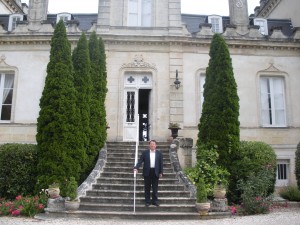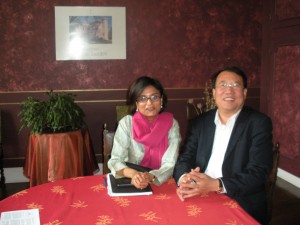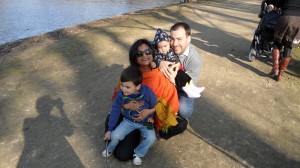One of the pleasures of Pallavi Aiyar’s Punjabi Parmesan § is that it addresses the pressing issues of contemporary Europe through a chorus of contrasting voices. Pallavi is a diligent reporter and a fine interviewer; she has an extraordinary knack for finding interesting people to talk to, on a wide range of subjects – the environment, inter-faith relations, immigration, the crisis of the Euro, the resilience of the German economy, the legacy of imperialism and so on.
Her other great strength is her knowledge of India and China: her gift for comparison often leads to unexpected insights. For instance, on the subject of tolerance and religious pluralism:
For most Indians, a certain amount of role-playing is an accepted part of life and the contradictions between one’s varied roles is not usually a matter of existential angst. An atheist bowing down before a shrine in a temple; a habitually mini-skirted girl choosing to dress demurely to meet her more conservative relatives; an observant teetotaller Jain offering his dinner party guests a glass of beer: such common accommodations are not about lacking the guts to stand up for one’s own beliefs as much as about expressing a respect for the beliefs of others. In Europe, this would probably have been frowned upon as hypocrisy. In India, it is considered tact. And tact has a definite advantage in a multicultural space. (85)
And
Europeans are usually quick to censure authoritarian China for the restrictions on the practice of religion placed by Beijing on its western Muslim-majority region of Xinjiang. In Xinjiang, muezzins are banned from using loudspeakers during their call to prayer. Imams are not permitted to teach the Koran in private, and the study of Arabic is allowed only at designated government schools. But the difference between the constraints on Islam imposed by China and those by some European countries is arguably a matter of degree rather than substance. (80)
In one wonderfully entertaining chapter, Pallavi accompanies a group of Chinese schoolchildren on a tour of Europe. ‘Chinese travellers have emerged as the European tourism industry’s knights in shining armour, riding to the rescue of otherwise stagnant economies.’ (187)
She visits Bordeaux where the Chinese have become a major force: ‘Thanks to the explosion of Chinese wine consumption, the price of Bordeaux wines had risen in recent years, even though wine consumption in France itself (where 50–60 per cent of the region’s wines are sold) had been falling. Chinese consumers of wine had played an important part in ensuring Bordeaux continued to flourish despite the economic slowdown in Europe and aggressive competition from new, world wines.’

She interviews Zhang Jin Shan the new owner of Chateau du Grand Mouëys, a well-known French vineyard.
Like Baron Dilip Mehta, Zhang Jin Shan is a man who does not mince his words.
‘Born in 1963, a few years before the start of the Cultural Revolution, Zhang grew up in the hardscrabble of an obscure town in one of China’s poorest provinces, Ningxia. His mother was a peasant working the fields, while his father had a small-time job in the local railways.
Zhang never made it to university but a technical diploma landed him an accounting job with a state-owned enterprise in 1983. By 1996, he had somehow made the leap to running a baijiu (a popular Chinese spirit) factory, and in 2000 he bought Ningxiahong, then a struggling factory, and transformed it into the successful, diversified business it is today. Other than goji berry-related products, the company’s activities currently also include real estate, printing, catering, and a travel agency.
Zhang did not seem to want to dwell on the past. During our interview, it was the future he was all fired up about. He was dismissive about the wine produced at Chateau du Grand Mouëys, in its current avatar, and oblivious to any hurt French feelings his curt assessment might engender… ‘It’s no good,’ he said, of the wine.

The taste, he claimed, was mama huhu, mediocre. Everything must change, including the packaging, he continued, because it was of ‘low quality’.
Pallavi is often scathing about European pretensions, most of all on matters relating to the environment (there is a wonderful section on the Copenhagen conference, which she covered). In my view though, this is one subject on which she allows her gift for satire to get the better of her judgement.
There can be no doubt that Europe does speak in many voices on the environment and some of these are indeed sanctimonious, hypocritical and self-serving. But this cacophony can be misleading: it is more productive perhaps to focus on what Europe actually does. And the fact is that Europe has moved in a direction that is markedly different from the trajectory of the US, Australia and Canada: some of the countries of the EU have banned fracking for example, and many are vigorously exploring sources of alternative energy. Most of all in Europe there is a willingness to accept the reality of climate change: it is telling that Europe does not have any counterparts to the well-funded denial movements that play such an important part in the debate in Anglo-Saxon countries. Some European countries, like Holland, have already made extensive preparations for large-scale flooding etc: the world has a great deal to learn from them. I have written about this subject elsewhere and will not belabour it here. Suffice it to say that in my view Europe holds what little hope there is for any kind of leadership on matters relating to climate change.
Although Pallavi does not pull any punches, she is at heart a firm believer in the idea of Europe. She also insists on its relevance to the world, and especially to India. One of her most interesting insights is this:
‘It struck me with some force how in many ways the Chinese were the Americans of Asia, while the Indians were the Europeans. As players on the international stage, the United States and China are both goal-oriented and able to act decisively in their national interest. Despite the existence of internal divisions, they are coherent entities that speak with a unified voice. Backed by hard power, their strategic planners take a long-term view of evolving rivalries and alliances.
‘In contrast, the Indians, like their European counterparts, are notable for the glacial pace of their decision-making. Constrained by the workings of coalition politics, both the twenty-seven-member EU and India valorize plurality and argumentation over actual outcomes and performance. They often appear unable to articulate a clear vision of their core interests, with internal factiousness hijacking unified, long-term agendas. Unlike the Unites States and ironically, ‘communist’ China, the political mainstream in both Europe and India is Leftish and characterized by a distrust of unfettered markets.
‘Polyphonic (both boast over twenty official languages) and seemingly chaotic, the EU and India are the world’s two most populous democracies. The commonalities between them are underscored by the fact that their governments use an identical catchphrase to describe their union: ‘unity in diversity’.
‘But despite the similarities, or perhaps because of them, neither India nor the EU was particularly engaged with the other. Rather, the US and China formed the twin poles of their (once again) common strategic fixations. Ultimately, both India and the EU were in essence soft powers, beguiled by and envious of the hard muscle shown by the Americans and the Chinese.’ (226-7)
As she points out, India and Europe are in many ways mirrors of each other, only they don’t know it:
‘In some ways, India is a proto-European Union, having stitched together a large region of diverse social and cultural fabric into a political and economic union. Like the EU, it is the antithesis of the concept of the nineteenth-century European nation state where a single religion, a single language and a common enemy form the ‘natural’ basis for the only sustainable kind of political unit.’ (306)
‘Yet, few Indians are invested in the idea of Europe—an attitude that is mirrored in Brussels, where few seem even aware of the idea of India. As a result, both India and the EU fail to engage with the other seriously, in what seems to be a classic case of familiarity breeding contempt. As essentially soft powers, hamstrung by coalitions and the niceties of convoluted political processes, and consumed by the challenges of handling enormous diversity, the EU and India sneer at each other’s purported incompetence and arrogance. Instead, it is the hard powers of the United States and China that are the poles of their common strategic fixations and awe.’ (312-3)
Elsewhere she writes:
‘India and the European Union are not just cumbersome polities; they are huge political achievements that allow the world to imagine alternative, inclusive configurations to the exclusions and bigotry of national tribalisms. This is not to claim that either lives up perfectly to its own underlying idea. Both remain messy and contradictory and half-baked. But in their idealized potential there resides considerable hope for humanity.’
These are words of real wisdom.

In sum Punjabi Parmesan is the story of the shared journey of Europe, India and China over the last tumultous decade.
It is an enormously ambitious narrative, yet the human scale of its perspective, its unflinching honesty, its critical acuity, its humour and generosity, and the directness of the writing make it wonderfully readable as well as richly instructive.
The book ends with Pallavi and her family moving to Jakarta where her husband has been appointed to a position in the EU’s delegation. Pallavi is now the Hindu’s Indonesia correspondent. I very much hope that her new assignment will lead to another volume of this engrossing journalistic autobiography.
____________________________________________________________
§ Forthcoming Penguin India, December 2013. All pictures courtesy Pallavi Aiyar.
